L-Theanine Supplement Suppresses Prostate Cancer, New Study Shows
Administering L-theanine — the compound in green tea that triggers relaxation — to mice suppresses the spread of prostate cancer cells.
Highlights
- L-theanine reduces the cancerous behavior of human prostate cancer cells.
- Supplementing with L-theanine reduces the spread of prostate cancer in mice.
- L-theanine appears to suppress the spread of prostate cancer by reducing the activation of specific genes.
Plaguing the Earth with devastation, cancer is the second leading cause of death worldwide, after heart disease. Among men, prostate cancer is the second most common cancer, after lung cancer. Moreover, the greatest cause of mortality from prostate cancer is metastasis (the spread of cancer cells from their original location), suggesting millions of lives could be saved with the prevention of prostate cancer metastasis.
Intriguingly, drinking green tea is associated with reducing the risk of prostate cancer. Furthermore, each additional cup of green tea, which contains the non-protein amino acid L-theanine, is associated with further lowering the risk of prostate cancer. To explore these promising findings, scientists from Nanjing Normal University in China administered L-theanine to mice that model prostate cancer. Miraculously, the results showed that L-theanine supplementation suppressed metastasis.
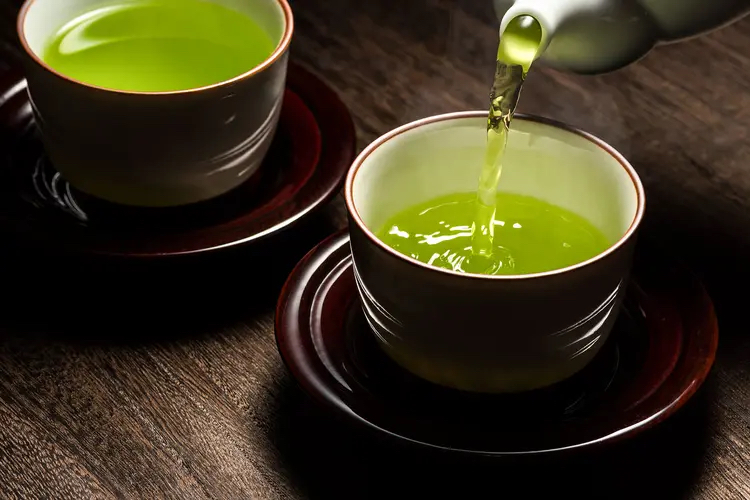
L-Theanine Reduces Cancerous Behavior in Human Cells
Metastasis requires the perfect storm of genetic mutations, allowing cancer cells to break into the bloodstream. Invasion refers to the process by which cancer cells escape their original environment and spread to surrounding tissues. To assess invasion, researchers placed human prostate cancer cells into small wells containing a permeable membrane. It was found that L-theanine reduced the number of cells that crossed the membrane, indicating that L-theanine reduces invasion.
Once cancer cells have escaped their original location and invaded surrounding tissues, they can migrate to the bloodstream. To assess migration, the researchers scratched a line through a dish full of cultured human prostate cancer cells to simulate a wound. Under the microscope, the “wound” appears as a gap between cells. The researchers found that this gap narrowed less when the dish contained L-theanine, suggesting L-theanine reduces prostate cancer cell migration.
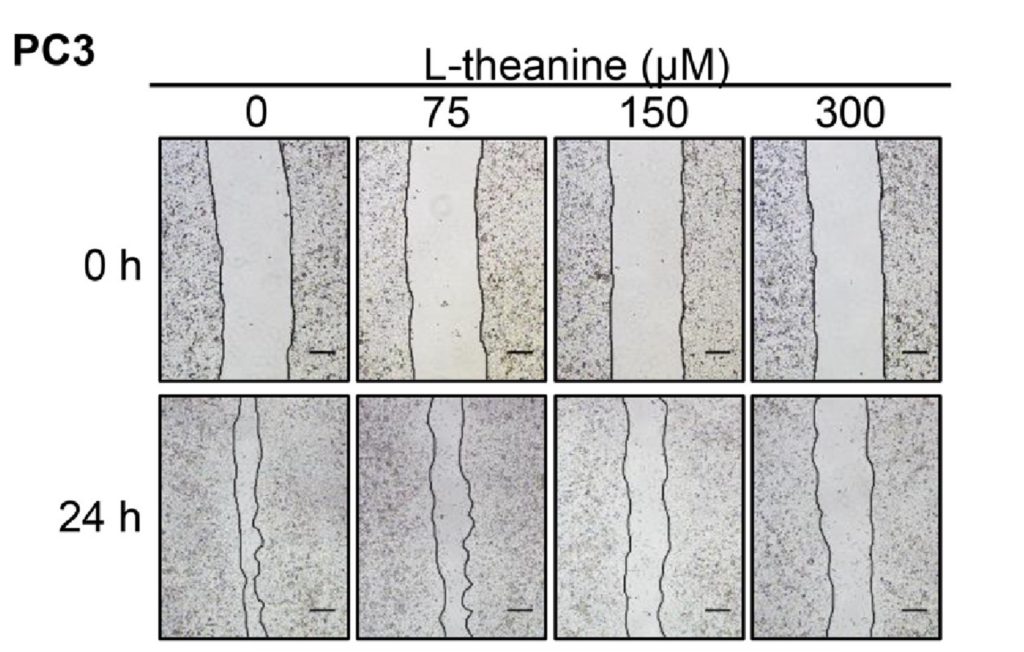
In addition to invasion and migration, cancer cells can clump together; a behavior known as cell-cell adhesion. Curiously, in assessing cell-cell adhesion, the researchers found that L-theanine increased clumping. To this end, the authors said,
“We also found that L-theanine could promote the cell-cell adhesion of prostate cancer cells, which prevents the tumor cells metastasis from the primary site to other organs.”
Moreover, L-theanine did not affect the survival of human prostate cancer cells. These findings led the researchers to examine the behavior of prostate cancer cells in living mice.
L-Theanine Suppresses Prostate Cancer Growth in Mice
To model prostate cancer, the researchers injected human prostate cancer cells into young, severely immunocompromised mice. Since the immune system efficiently destroys cancer cells, especially during the earlier stages of life, employing young, immunocompromised mice assures metastasis and tumor growth. Critically, the prostate cancer cells were engineered to produce an enzyme that emits light, allowing the researchers to visualize the cancer cells inside living mice.
Immediately following the injection of cancer cells, the mice were treated with either saline (a solution of salt and water), 40 mg/kg of L-theanine, or 80 mg/kg of L-theanine. Using bioluminescent imaging, the researchers found that the mice treated with saline displayed prostate cancer cells throughout the body, indicating metastasis and tumor growth. This sort of tumor growth is expected in mice not given a treatment against cancer. In contrast, mice treated with 40 mg/kg of L-theanine displayed far fewer cancer cells, and those injected with 80 mg/kg exhibited even less cancer cell growth.
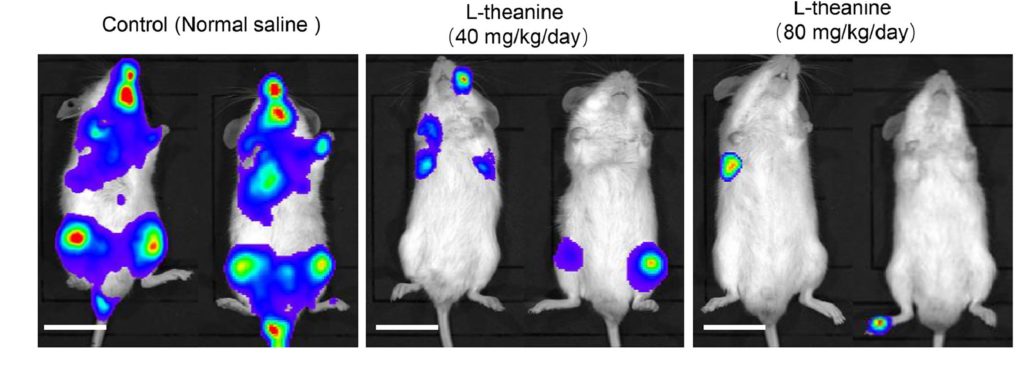
To study cancer cell spread more carefully, the researchers examined postmortem tissues and found L-theanine to reduce internal organ metastasis. In mice treated with 80 mg/kg of L-theanine, the heart, liver, spleen, kidney, and intestine showed little to no bioluminescence, suggesting cancer cells had not spread to these organs. Notably, L-theanine also reduced metastases to bone, where metastasis commonly occurs in patients with severe prostate cancer.
How L-Theanine Suppresses Cancer Spread
Most cells within solid tissues, including those in the prostate, are attached to a matrix known as the extracellular matrix. To gain invasion capacity, cancer cells can produce a protein called Snail, which allows them to detach from the matrix and migrate elsewhere. The researchers found that L-theanine inhibited the production of Snail, which should keep prostate cancer cells attached to the matrix.
To migrate through tissue, cancer cells also produce enzymes called matrix metalloproteinases, which degrade the matrix. The researchers found that L-theanine reduced the production of matrix metalloproteinase 9 (MMP9), one of the 23 members of the matrix metalloproteinase family. Thus, by reducing the production of Snail and MMP9, L-theanine may stop prostate cancer cells from invading surrounding tissues and migrating through the matrix to reach the bloodstream.
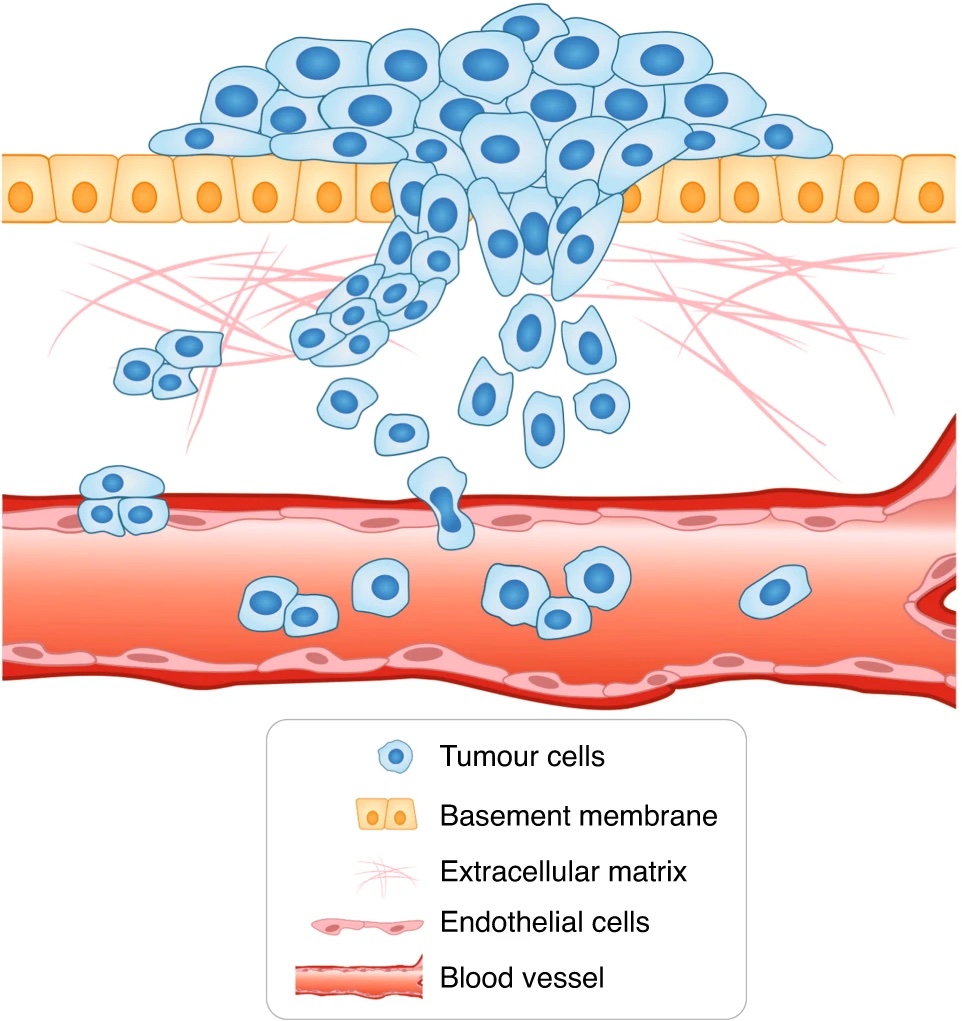
Through a series of further experiments, the researchers elucidated how Snail and MMP9 are downregulated by L-theanine. By examining cellular pathways associated with Snail, MMP9, and cancer metastasis, the researchers eliminated the possibility that L-theanine affects a pro-inflammatory protein called IL-6 that activates the cancer-promoting protein STAT3.
Instead, they found that L-theanine suppresses the ERK cellular signaling cascade. This cascade leads to the transport of a protein called p65 into the nucleus, which increases the production of MMP9 and Snail. Thus, by inhibiting the ERK pathway, L-theanine reduces the production of MMP9 and ERK, thereby suppressing prostate cancer metastasis. How L-theanine blocks the activation of ERK remains unknown.
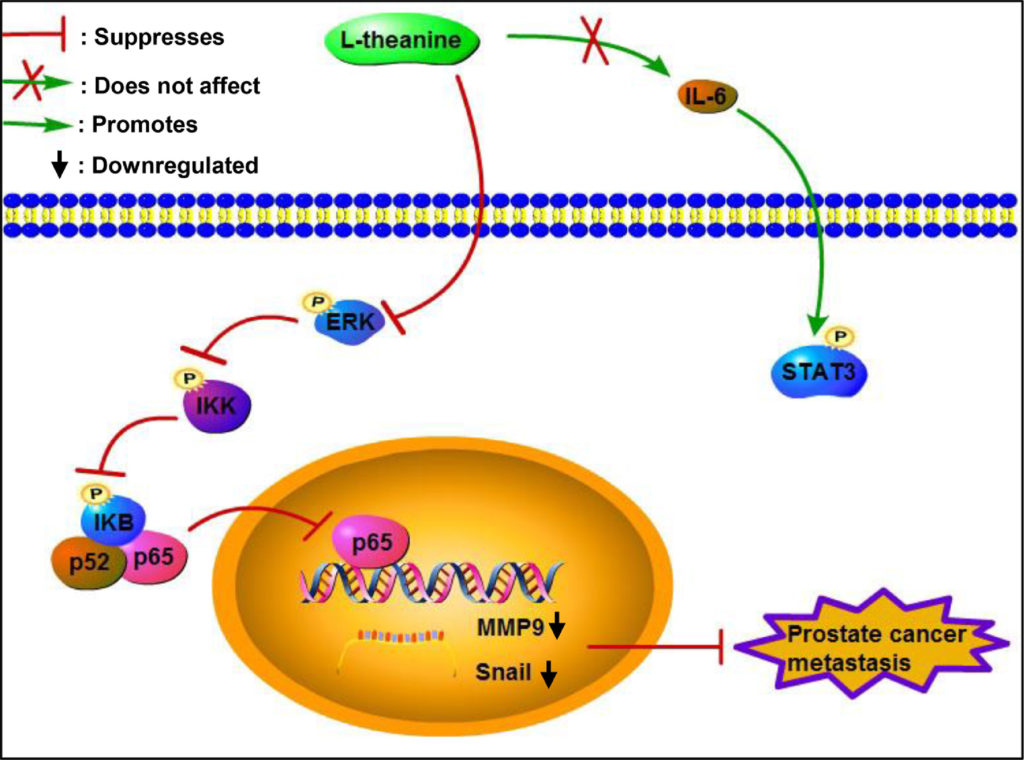
The Anti-Aging Effects of L-Theanine
There is a lack of human studies confirming that L-theanine supplementation can slow aspects of cellular aging. Although one study has shown that L-theanine improves cognitive function in older adults, and another study demonstrated similar results in middle-aged adults. These randomized clinical trials give credence to the idea that L-theanine may slow aspects of cellular aging in the brain.
Furthermore, a handful of studies have shown that L-theanine has anti-aging effects in model organisms. The most recent study showed that combining vitamin D with L-theanine reduces stress in aged mice by restoring dopamine levels. Other studies have shown that L-theanine protects against intestinal, kidney, muscle, liver, and brain aging in rodent and cell models of aging. Furthermore, L-theanine has been shown to prolong the lifespan of worms.
Together, it would seem that L-theanine may have beneficial effects against cellular aging. What’s more, L-theanine supplements have long been considered safe and are relatively inexpensive. For humans, the higher dose used on the prostate cancer mouse model would be roughly 400 mg/day. However, reducing the risk of prostate cancer does not have to include L-theanine. According to Johns Hopkins, there are other preventative measures:
- Reduce trans and saturated fat intake while focusing on omega-3 fatty acids
- Eat fruits, vegetables, and soy
- Avoid charred meat
- Drink green tea
- Exercise regularly and maintain a healthy weight
- Don’t smoke or drink
- Assure adequate vitamin D intake
- Stay sexually active
As a supplement, L-theanine may enhance or add to these lifestyle interventions. Nevertheless, in the context of prostate cancer, it is unclear whether L-theanine has a potent enough effect on its own.
Model: Severely immunocompromised male mice called non-obese diabetic (NOD)- severe combined immunodeficiency (SCID) mice.
Dosage: Injection of 80 mg/kg of L-theanine

